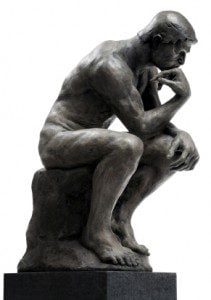 A key question today in discussions of mind and matter is: can we explain consciousness by way of the brain without remainder, that is, apart from any consideration of an immaterial mind or soul? Aristotle and Descartes argued for non-materialist conceptions of life involving both soul or mind and body. In what follows, I will discuss their views and touch briefly upon a materialist conception.
A key question today in discussions of mind and matter is: can we explain consciousness by way of the brain without remainder, that is, apart from any consideration of an immaterial mind or soul? Aristotle and Descartes argued for non-materialist conceptions of life involving both soul or mind and body. In what follows, I will discuss their views and touch briefly upon a materialist conception.
Aristotle’s model of hylomorphism is the combination of matter and form or body and soul as two dimensions of one being (for Aristotle, the soul is the form of the body and the body is the matter of the soul). Descartes’ dualism is the separation of matter and mind or soul as two entities or substances in one person. I should add that both philosophers saw the soul or mind as centrally located (the heart for Aristotle and the pineal gland situated in the brain for Descartes), though united with and governing all body parts; it is also very likely that both maintained a sense of interaction between the two, though it is debated in the case of Descartes (see here). For Aristotle, given the intimate connection between the soul and body (i.e., the power of sight is to the eye as the soul is to the body), it makes sense that he did not hold to the personal immortality of that dimension of the soul or mind known to him as the receptive intellect (though he did hold to the immortality of what he took to be the activating soul or mind). For Descartes, one’s personal soul or mind is eternal.
Key questions arise. For Aristotle, how can the mind or soul transcend matter in its apparent ability to conceive that which is immaterial or non-material? Given their intimate connection, can the mind or soul really be free given the propensity of biologically determining factors? For Descartes, how can the soul or mind really act upon the body and interact cohesively with it? Descartes’ model may be able to provide better support for the notion of the freedom of the will in a universe shaped by what many take to be determining forces of nature, but does he adequately show that the mind or soul influences the body given their separation? Such issues as these bear upon ethics and meaningful existence: can human actions be considered morally good or bad if they are determined by forces of heaven or nature? If not, what happens to human dignity? Can we have confidence in our senses that what appears to be the case—the freedom to choose—is not an illusion?
Should we look elsewhere for a discussion of freedom, perhaps nature itself? Might quantum physics provide avenues for considering moral freedom or does determinism win out in the end there as well? (For articles on the debate over whether or not quantum physics supports or does not support the freedom of the will, see “The Quantum Physics of Free Will,” “What Does Quantum Physics Have to Do with Free Will?,” and the treatment of this theme in “Causal Determinism”).
Should we go with a materialist conception of life as in the case of La Mettrie after Descartes? Does materialism solve the problem, or does it only make the problem worse? According to atheist philosopher Thomas Nagel, materialism is deeply problematic, as argued in in his book, Mind and Cosmos: Why the Materialist Neo-Darwinian Conception of Nature Is Almost Certainly False. Nagel affirms naturalism while rejecting materialism (See Alvin Plantinga’s treatment of these categories in his review of the book at the New Republic). In a review of Nagel’s book involving a discussion of Aristotle, Descartes, Aquinas and Medieval Scholasticism, Edward Feser reflects upon materialism. Feser writes of the modern rejection of our conscious experience’s association of qualitative features with matter coupled with the location of meaning and purpose in the mind (and not at all in the external world); he also reflects upon the modern materialist move to reject Descartes’ dualism while retaining his view of the material domain:
This Cartesian dualist position is notoriously problematic, and modern materialists have opted to throw out Descartes’ immaterial substance while holding on to his view of the material world. But their own position is, if anything, even more problematic.
The conception of matter they share with the Cartesian dualist says matter is inherently devoid of the qualitative features we know from conscious experience [of] color, sound, heat, cold, etc.[,] as well as of meaning or purpose of any kind. To deny that there is anything immaterial that has these features is therefore to imply that there is nothing at all that has them[,] and thus, in turn, to deny that our conscious experiences or the meanings of our very thoughts and words are real. This “eliminative materialist” position is ultimately incoherent, and few philosophical naturalists are willing to embrace it[,] though Alex Rosenberg’s recent The Atheist’s Guide to Reality promotes a version of eliminativism[,] but the conclusion that a consistent materialism leads to it is difficult to avoid (See Feser’s review in First Things at “Aristotle, Call Your Office”; further to Feser’s review, it is striking to me how many of the treatments criticizing belief in a soul and consciousness beyond the brain focus on Descartes and do not account for Aristotle and Medieval Scholasticism on the subject).
Where should we turn? How should we proceed? Should we refuse to engage positions that challenge our own received orthodoxies of theistic or atheistic origin? Should we throw up our hands in despair? Theodore Tracy, S.J. sets forth in the conclusion of his helpful comparison of Aristotle and Descartes a solid summary of key aspects of the debate and a good word for future deliberations:
There we have it, then. Two models of human nature, soul and body,—Aristotle’s hylomorphism and Descartes’ dualism. Each has its problems: If body and soul are united as matter and form, how do we account for the soul’s apparent power to transcend matter in conceiving the non-material, the universal? How satisfy man’s almost universal longing for personal survival after death? On the other hand, if soul is a thinking substance entirely independent of matter, and body a mere machine of well-coordinated material parts, how can they possibly be united and interact in a single composite organism? We can, of course, go a step further, as did La Mettrie a century after Descartes, and discard the notion of soul altogether, settling for the bleak view that all living beings, including man, are merely quasi-machines. But that view also has its problems. Perhaps most important is that we continue to search, to think about the problem of body and soul. Or at least that we continue to think. For, as Descartes points out in the second Meditation (H-R I, 151; A-T VII, 27), “it might possibly be the case that—if I ceased entirely to think—I should likewise cease altogether to exist” (“. . . nam forte etiam fieri posset, si cessarem ab omni cogitatione, ut illico totus esse desinerem”) (Refer here to his fine article: “Two Views of Soul: Aristotle and Descartes” in Illinois Classical Studies, XI).
















